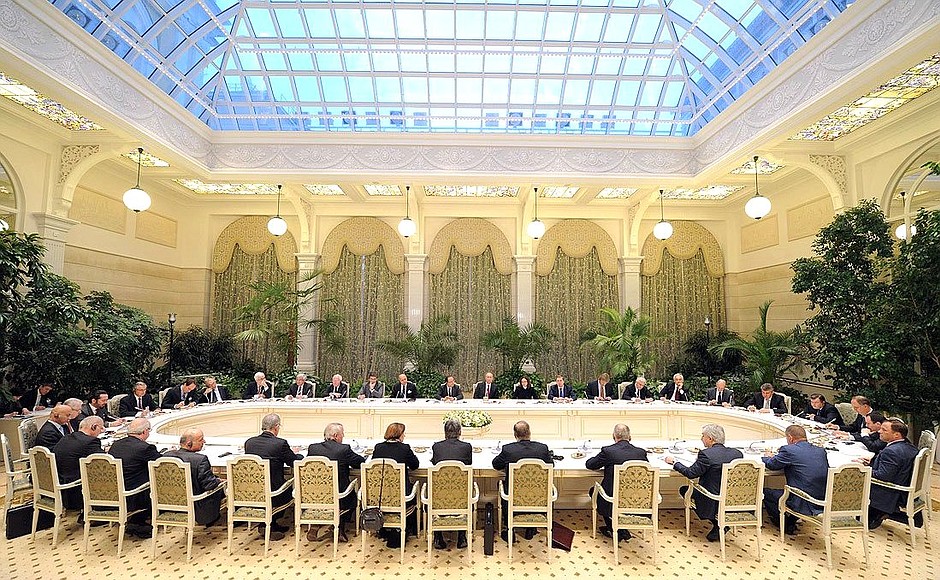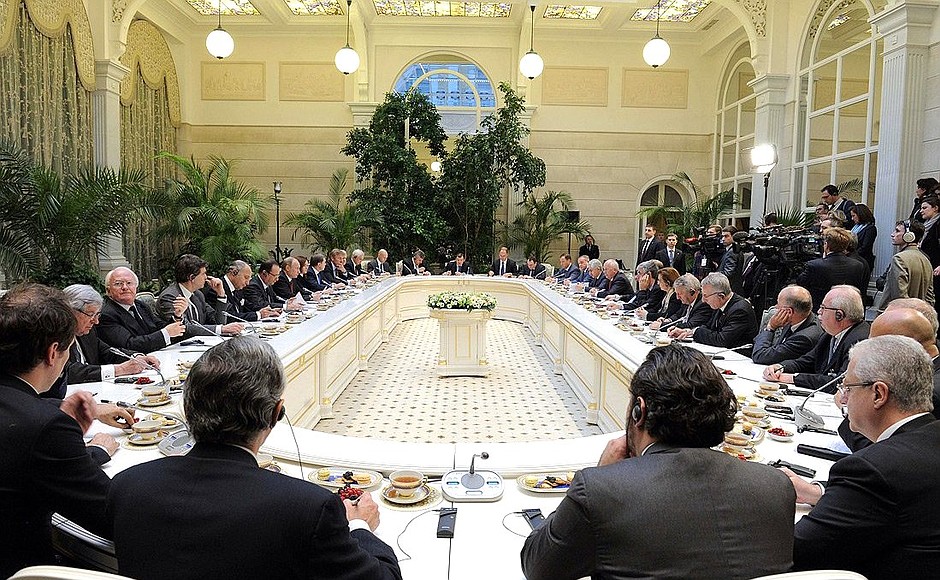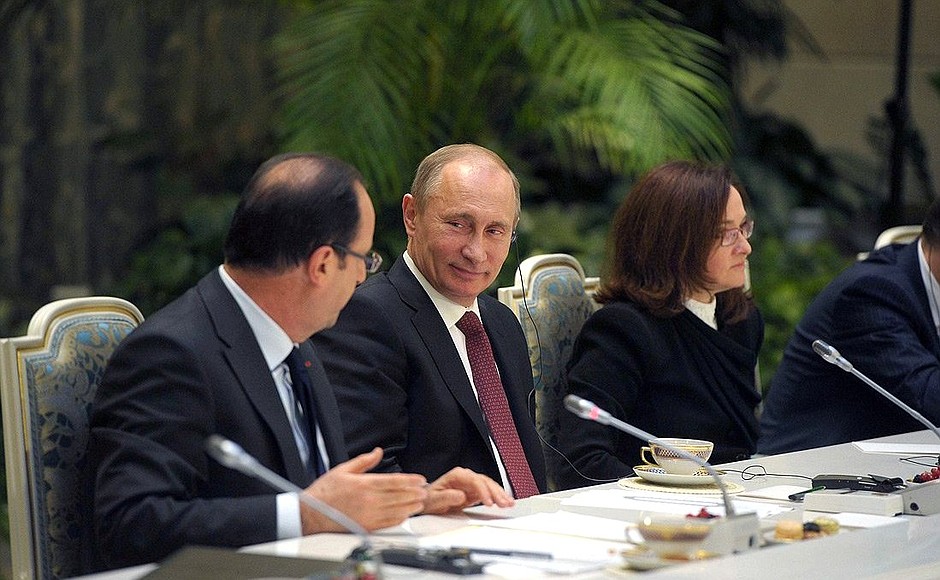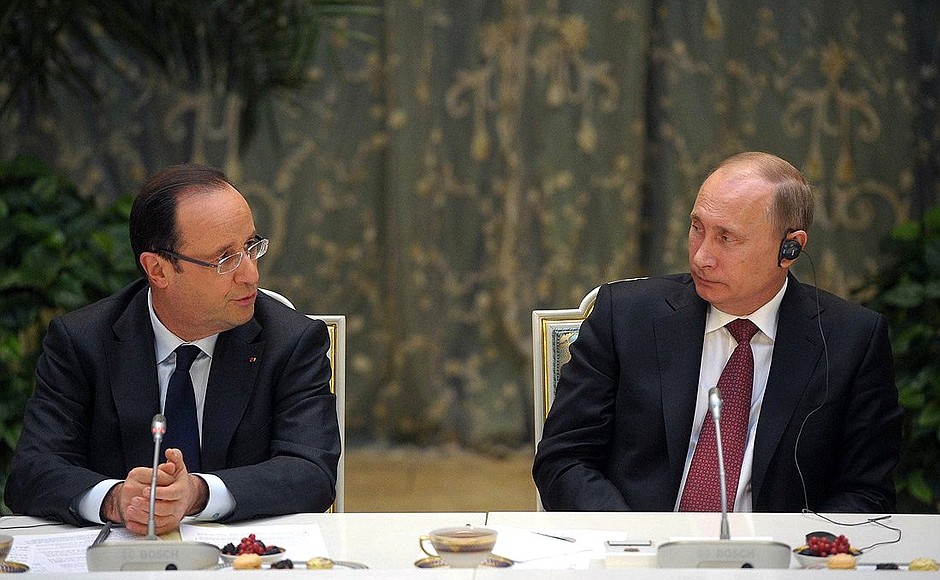* * *
President of Russia Vladimir Putin: Mr President, friends, colleagues,
I am happy to welcome leading Russian and French entrepreneurs to the Kremlin.
We attach much significance to the dialogue with business community, so it makes perfect sense that such a meeting is on the French President’s agenda for this visit. Speaking with business representatives gives us the opportunity to get first hand information about our nations’ trade and economic cooperation and its prospects.
Just now at the press conference, we were asked whether business representatives complain about the business environment in Russia and in France. I said that members of the business community always complain in every nation. But we have this good opportunity now to address all these issues.
In 2011, our bilateral trade reached a record level of $28.1 billion. Unfortunately, its volume decreased in 2012. Experts agree that the main reason for this decline has to do with crisis developments in the eurozone. I am confident that we have every opportunity not only to return to 2011 levels, but to surpass them in the near future. Of course, this will require joint active work on the part of the business community and administrative structures at all levels.
Let me remind you that there are over 470 businesses with French capital operating in Russia. And the total volume of French investments in the Russian economy exceeds $9 billion.
Russian investments in the French economy are much more modest – no more than $190 million. Our common challenge is to make the investment flows more balanced.
The coordination mechanisms of the Russian-French Economic, Financial, Industrial and Trade Council (CEFIC) will serve to help change the situation.
See also
We also expect help in resolving this problem from the Russian-French Business Council, established in November 2012, as well as the Russian Direct Investment Fund and France’s Deposits and Consignments Fund, which signed a Memorandum on promoting mutual investments today.
Production cooperation is an important direction in our partnership. Large-scale bilateral projects are being successfully implemented in energy, car manufacturing, transport engineering and many other areas.
The Rosatom state corporation, together with its French partners, works on developing a fourth-generation fast neutron reactor. I feel that such joint efforts will give Russian and French nuclear experts a tangible competitive advantage on the global market, where the competition is very tough and is constantly increasing.
We are also working closely to implement major infrastructure projects in energy, particularly in the gas sector – I am referring to Nord Stream and South Stream. The French GDF Suez holds a 9 percent stake in Nord Stream AG, the company carrying out the construction and operation of the Nord Stream pipeline. Another French company, EDF, holds a 15 percent stake in the South Stream project, a pipeline system that runs along the bottom of the Black Sea.
Avtoframos (annual production capacity in Russia of up to 160 thousand Renault cars) and Peugeot Citroen are working stably on the Russian market. In December 2012, a joint venture was created between AvtoVAZ and Renault-Nissan Group (with investments totalling $350 million).
A programme to build the Sukhoi Superjet 100 short-range passenger aircraft is underway with participation by French companies. And the total French share in the project is more than 30 percent. The project’s overall cost is $1.5 billion.
Together with Alstom, Russia’s Transmashholding created a company in Novocherkassk to manufacture next generation locomotives. In 2013–2020, Russian Railways will get 200 new electric locomotives worth a total of 1 billion euro. And these companies have experience in cooperating successfully within the Customs Union. Just recently, in December 2012, they jointly opened an electric locomotive plant in Kazakhstan (with investments worth 50 million euro).
Our cooperation is also reaching new levels in one of the most science-intensive sectors, the space industry. Our joint landmark in this field has become the Soyuz project at the Guiana Space Centre. We have already had four successful launches of Russian carrier rockets from the launch complex in Kourou. In 2013, we plan to launch six more space vehicles.
”Among the problems standing in the way of business are delays in introducing a visa-free travel between Russia and the EU. The current situation, of course, is not conducive to increasing individual visits and business contacts. And here, we count on support from our French friends. We know the position of France’s leaders on this issue and we hope that it will move toward being resolved.“
We welcome the participation of French companies in implementing major infrastructure projects in Russia. In this respect, I would like to point to the establishment in June 2012 of a large-scale project to produce liquefied natural gas and the construction of a new Arctic port near the Sabetta village on the Yamal peninsula, through which energy resource will be transported along the Northern Sea Route. The project’s cost is estimated at around $18–20 billion.
I will note that in recent years, there has been a significant increase in business activity of our regions. Today, a declaration of intent was signed to create a partnership between the Association of Innovative Regions of Russia and the Provence-Alpes-Cote d’Azur region in France.
Among the problems standing in the way of business are delays in introducing a visa-free travel between Russia and the EU. The current situation, of course, is not conducive to increasing individual visits and business contacts. And here, we count on support from our French friends. We know the position of France’s leaders on this issue and we hope that it will move toward being resolved.
Friends,
We will certainly continue to promote deepening and diversifying business cooperation between France and Russia. However, we cannot do it without the support of the business community, without your support, without your action and initiative.
French firms have been working in Russia for a long time. They are quite familiar with this setting, they know both the positive aspects of working in Russia and the difficulties and problems they have to face. But practically none of them leave the Russian market. And this is a good signal, a good sign. All of you continue to carry out your activities here, which means that these activities yield the necessary dividends and profits.
This fact gives us confidence that bilateral business cooperation has excellent prospects. I am certain that by working together, we can create truly favourable conditions for the stable development of our national economies and improving our citizens’ living standards. This is particularly important during the current difficult period for the global economy.
I would like to note that the problems faced by the eurozone are not unique. The same thing is happening in North America and in many other regions of the world. But even though you could generally say that we are progressing according to plan, demonstrating good performance indicators, we nevertheless feel a certain level of trepidation. We are all very closely interlinked and understand that if one of us has a problem, it will somehow affect all of us. And conversely, if one of us achieves success, everyone can count on it, it will be good for all of us.
In this respect, we welcome Mr Hollande’s visit to Russia and I am certain that it will give a good impulse to further development of our business relations.
Thank you for your attention.



